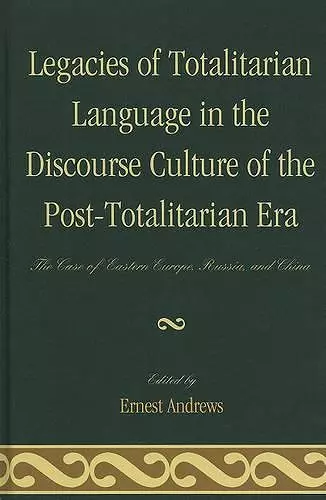Legacies of Totalitarian Language in the Discourse Culture of the Post-Totalitarian Era
The Case of Eastern Europe, Russia, and China
Format:Hardback
Publisher:Lexington Books
Published:19th May '11
Currently unavailable, and unfortunately no date known when it will be back

This book is unique in its kind. It is the first scholarly work to attempt a comprehensive and fairly detailed look into the lingering legacies of the communist totalitarian modes of thought and expression in the new discourse forms of the post-totalitarian era. The book gives also new and interesting insights into the ways the new, presumably democratically-minded political elites in post-totalitarian Eastern Europe, Russia, and China manipulate language to serve their own political and economic agendas. The book consists of ten discrete discussions, nine case-studies or chapters and an introduction. Chapter 1 discusses patterns of continuity and change in the conceptual apparatus and linguistic habits of political science and sociology practiced in the Czech Republic before and after 1989. Chapter 2 analyzes lingering effects of communist propaganda language in the political discourse and behavior in post-communist Poland. Chapter 3 analyzes the legacy of Soviet semantics in post-Soviet Moldovan politics through the prism of such politically contested words as "democracy," "democratization," and "people." Chapters 4 and 5 discuss the way in which communist patterns of thought and expression manifest themselves in the new political discourse in Romania and Bulgaria, respectively. Chapter 6 examines phenomena of change and continuity in the socio-linguistic and socio-political scene of post-Soviet Latvia. Chapter 7 analyzes the extent to which the language of the post-communist Romanian media differs from the official language of the communist era. Chapter 8 examines the evolution of Russian official discourse since the late eighties with a view of showing "whether or not new phenomena in the evolution of post-Soviet discourse represent new development or just a mutation of the value-orientations of the old Soviet ideological apparatus." Chapter 9 gives a detailed and lucid account of the evolution of both official and non-official discourse in China since the end of the Mao era.
The book is a pioneering investigation of the lingering linguistic memories of the totalitarian past in contemporary post-Communist discourses. Contributions related to Eastern Europe, Russia and China provide a multi-faceted lens to view linguistic processes across societies with various Communist and post-Communist experiences. -- Lara Ryazanova-Clarke, The University of Edinburgh
This wide-ranging collection of perceptive and thought-provoking studies of change from communism, and within communist systems, demonstrates why revolutions rarely permit a clean break with the past. Language continues, carrying patterns of thought across historic events, even when a new regime tries to alter a nation’s thinking by changing the permitted modes of expression. This is a dimension of political life that political scientists and practitioners alike need to assimilate. These essays make a valuable contribution to that endeavor. -- Ronald J. Hill, Trinity College, Dublin
This collection of essays offers a geographically diverse account of the legacy of totalitarian language in many former communist countries, with a chapter on post-totalitarian yet still communist China. * Slavic Studies *
The volume looks at examples of contemporary political and media discourse in a number of Eastern European countries, as well as Russia and China. The topics range from the language of sociological scholarship in Czechoslovakia, to the language of the media and electoral campaigns in Bulgaria, Romania and Moldova, to the intertwining linguistic and cultural legacies of the Soviet era, the interwar republic and the diaspora in Latvia....informative volume. * Slavic and East European Review, 90 *
ISBN: 9780739164655
Dimensions: 240mm x 163mm x 20mm
Weight: 503g
230 pages